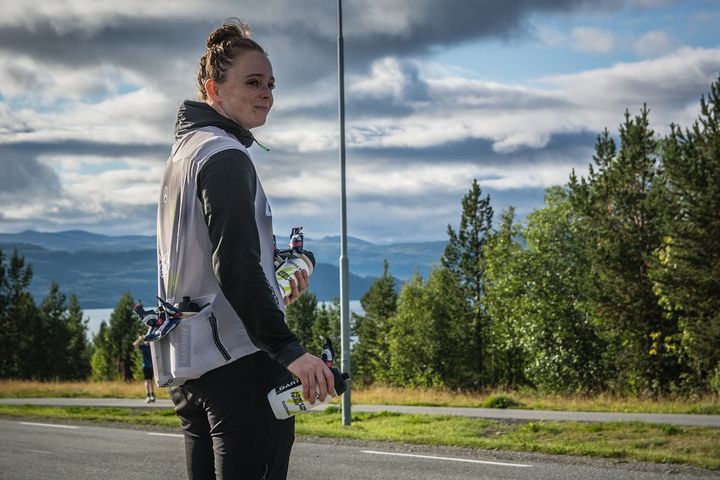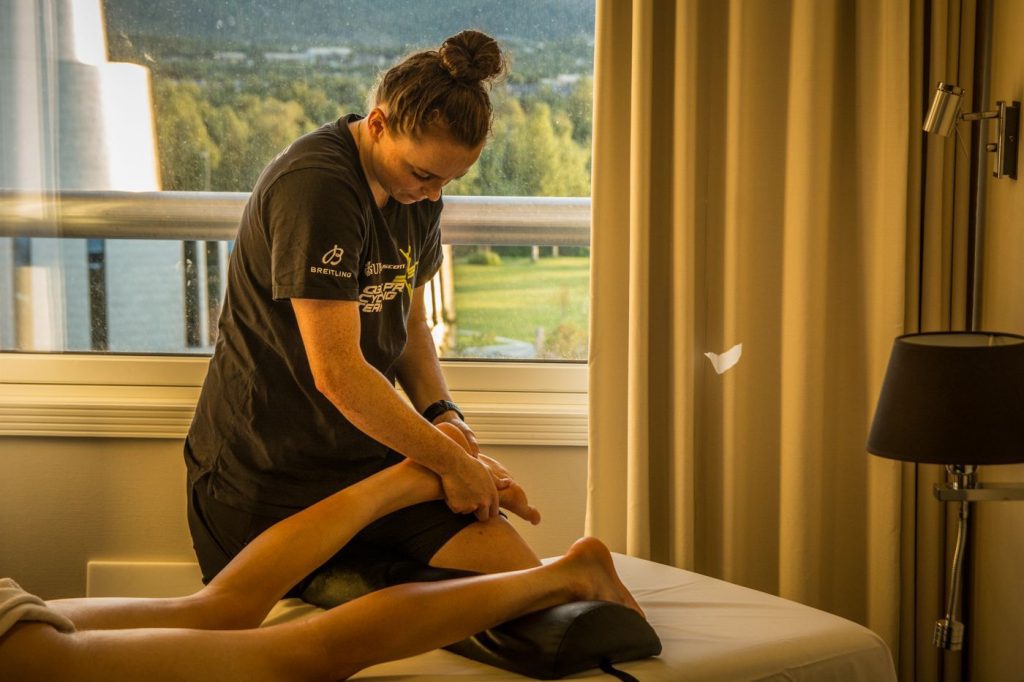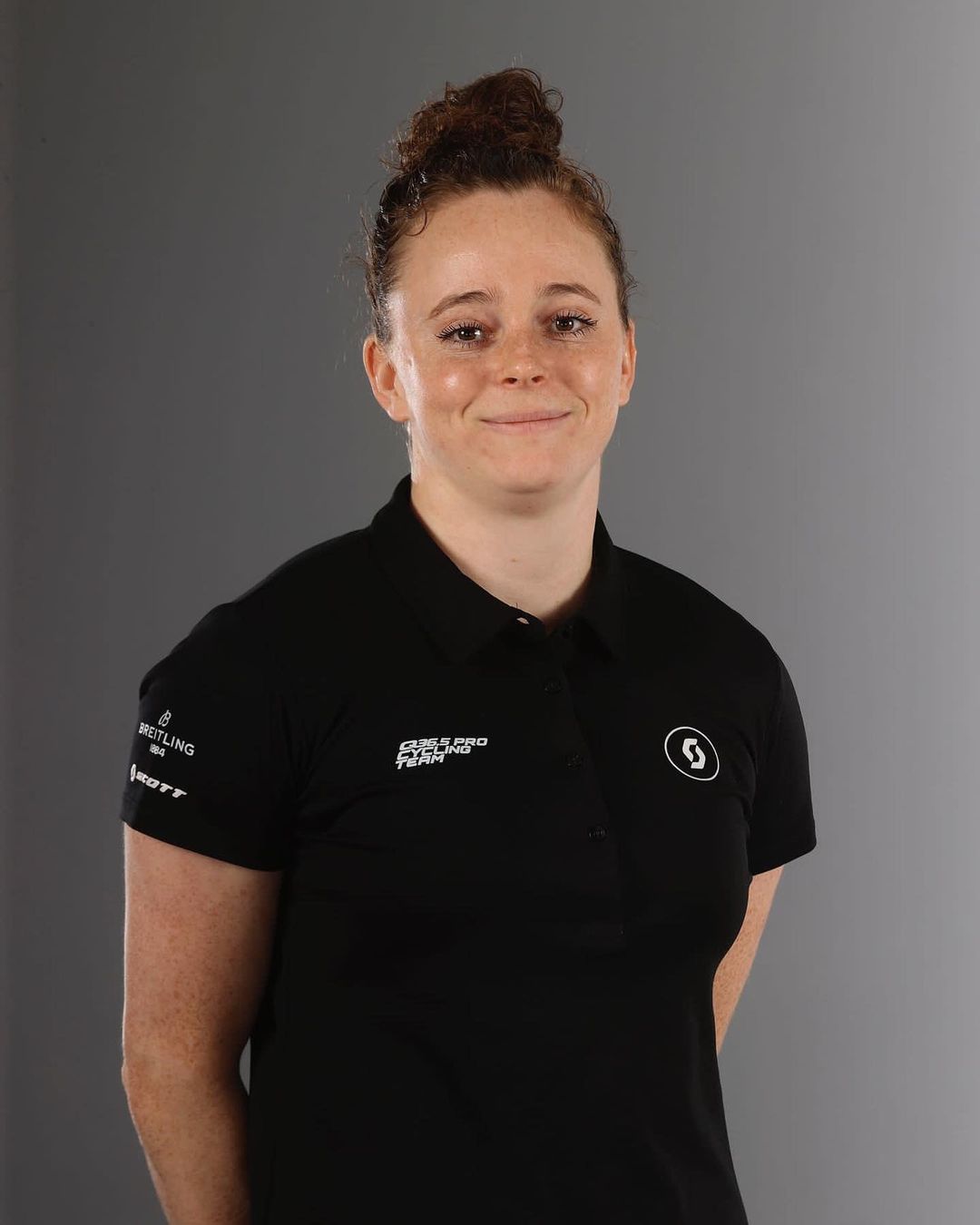In this interview, we have the pleasure of meeting Roxanne Koopman, physiotherapist of the cycling team Q36.5 Pro cycling Team . She shares with us her experience and expertise in the field of physiotherapy applied to professional cycling..

CT : What was your first attraction to the field of physiotherapy and care in professional cycling? ?
RK : The world of cycling was a whole new experience for me. After working in rugby and football in the Netherlands for four years, the switch to cycling was a real surprise. The first year was particularly difficult, because I had to adapt to new responsibilities, such as taking care of runners, manage logistical aspects such as food and equipment, and carry out my functions as a physiotherapist. It was a challenge, but I appreciated the team dynamic and I had good support from my colleagues to improve. Now, after overcoming these initial challenges, I find the work of a physiotherapist in cycling very rewarding.
CT : What is your role as a physiotherapist and caregiver within the professional cycling team Q36.5 ?
RK : My main role is that of physiotherapist. I am responsible for managing runners' physical problems, whether after a fall during stage races or for mobilization sessions during rest days. I also make sure to supervise their muscle strengthening and mobility program.. Outside of my duties as a physiotherapist, I am also involved in logistical tasks such as preparing bottles and general assistance to riders.
CT : What are the main differences between the treatment of cycling athletes and other types of athletes? ?
RK : Treating cyclists presents unique challenges due to the nature of their sport. Cyclists spend long hours in specific positions, which can lead to wear and tear injuries, often at the hip and lower back. Recovery is usually quick due to the nature “machine-like” of the body of cyclists, but it is crucial to correctly diagnose the origin of the problems, sometimes going up to the hip or back. Furthermore, time management is essential, as we often have little time to treat riders between stages.
CT : What unique challenges do you face working with professional cyclists? ?
RK : The main challenge is time management. Unlike other sports where you can have a week to treat an athlete, in cycling, we often need to intervene quickly between stages. Furthermore, logistical aspects such as nutrition and organizing equipment can be complicated, especially when there is no chef.
CT : Can you tell us about a typical day as a physiotherapist at a cycling competition? ?
RK : Every day is a new adventure, especially depending on whether I am participating in a stage race or a one-day classic. Recall of facts, I often find myself on the classic roads. Between these races, there are always a few days of respite, a welcome break that allows us to focus on the behind-the-scenes details and taking care of our riders, especially after demanding events like Paris-Roubaix or the Amstel Gold Race. These days are dedicated to long and beneficial massages, targeting tension in the hips, lower back, and other areas. We take the time necessary for our runners to recover as best as possible. On the other hand, during stage races, time is a rare commodity. Late arrivals at the hotel leave little room for preparation for the next day. Of course, everything can change depending on the circumstances. In the event of a major fall or injury, Priority is immediately given to rider care, which can take up the whole day, even the evening. Fortunately, such situations remain rare. This is what a typical day in the world of professional cycling looks like.

CT : What are the main aspects of recovery and rehabilitation that you put in place for runners after races or training ?
RK : We focus on nutrition, hydration and massages to promote recovery. Depending on the individual needs of the riders, we can also recommend mobilization or muscle strengthening exercises.
CT : As a woman working in a sporting field that is often dominated by men, have you encountered any particular difficulties ?
RK : As a woman, I was used to working in male sporting environments, So it didn't cause me any major problems.. The important thing is to demonstrate professionalism and competence, and generally, athletes accept and respect this.
CT : How do you establish trust with the cyclists you deal with?, and how important is this relationship to their success? ?
RK : Establishing a relationship of trust is essential. Occasionally, simply talking with runners about their family or personal interests can help strengthen that relationship. It makes them feel heard and understood, which is especially important when they are away from home for long periods of time.
CT : Can you tell us about Kamil Malecki's impressive performances at De Ronde and Roubaix?, despite his previous physical setbacks ?
RK : Kamil overcame many physical obstacles last year, but his determination allowed him to come back strong this year. His remarkable performance at De Ronde and Roubaix is a testament to his hard work and resilience. We are all very proud of him and his achievements, and we hope he continues to shine in future races.
A huge thank you to Roxanne Koopman for her intellectual generosity and her precious time during this interview. His knowledge and experience has enriched our understanding of physiotherapy in the world of professional cycling..
